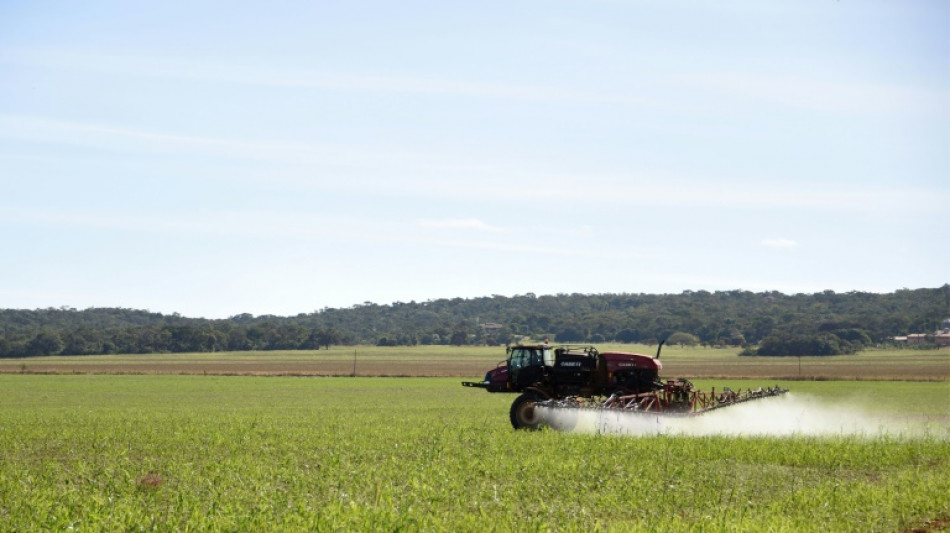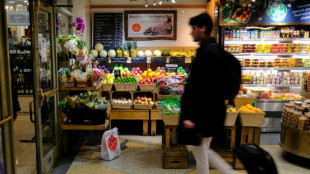
-
 US freestyle skier Ferreira wins Olympic halfpipe gold
US freestyle skier Ferreira wins Olympic halfpipe gold
-
Svitolina edges Gauff to set up Pegula final in Dubai

-
 'Proud' Alcaraz digs deep to topple Rublev and reach Qatar final
'Proud' Alcaraz digs deep to topple Rublev and reach Qatar final
-
UK govt considers removing ex-prince Andrew from line of succession

-
 New study probes why chronic pain lasts longer in women
New study probes why chronic pain lasts longer in women
-
Trump vows 10% global tariff after stinging court rebuke

-
 Aston Martin in disarray as Leclerc tops F1 testing timesheets
Aston Martin in disarray as Leclerc tops F1 testing timesheets
-
Venus Williams accepts Indian Wells wild card

-
 Anxious Venezuelans seek clarity on new amnesty law
Anxious Venezuelans seek clarity on new amnesty law
-
Last-gasp Canada edge Finland to reach Olympic men's ice hockey final

-
 Scotland captain Tuipulotu grateful for Wales boss Tandy's influence
Scotland captain Tuipulotu grateful for Wales boss Tandy's influence
-
Zelensky says no 'family day' in rare personal interview to AFP

-
 Zelensky tells AFP that Ukraine is not losing the war
Zelensky tells AFP that Ukraine is not losing the war
-
Sweden to play Switzerland in Olympic women's curling final

-
 Counting the cost: Minnesota reels after anti-migrant 'occupation'
Counting the cost: Minnesota reels after anti-migrant 'occupation'
-
UK police probe Andrew's protection as royals reel from ex-prince's arrest

-
 Doris says Ireland must pile pressure on England rising star Pollock
Doris says Ireland must pile pressure on England rising star Pollock
-
US military assets in the Middle East

-
 Neymar hints at possible retirement after World Cup
Neymar hints at possible retirement after World Cup
-
Stocks rise after court ruling against US tariffs

-
 Australia end dismal T20 World Cup by thrashing Oman
Australia end dismal T20 World Cup by thrashing Oman
-
Olympics chief says Milan-Cortina has set new path for Games

-
 Russian SVR spy agency took over Wagner 'influence' ops in Africa: report
Russian SVR spy agency took over Wagner 'influence' ops in Africa: report
-
Pegula fights back to sink Anisimova and reach Dubai final

-
 Trump administration denounces 'terrorism' in France after activist's killing
Trump administration denounces 'terrorism' in France after activist's killing
-
Colombia's Medellin builds mega-prison inspired by El Salvador's CECOT

-
 German broadcaster recalls correspondent over AI-generated images
German broadcaster recalls correspondent over AI-generated images
-
US Supreme Court strikes down swath of Trump global tariffs

-
 England's Itoje says managing 'emotional turmoil' key to 100 cap landmark
England's Itoje says managing 'emotional turmoil' key to 100 cap landmark
-
Trump says weighing strike on Iran as Tehran says draft deal coming soon

-
 Tudor is '100 percent' certain of saving Spurs from relegation
Tudor is '100 percent' certain of saving Spurs from relegation
-
Azam dropped for scoring too slowly, says Pakistan coach Hesson

-
 Stocks volatile after soft US growth data, court ruling against tariffs
Stocks volatile after soft US growth data, court ruling against tariffs
-
Italy bring back Capuozzo for France Six Nations trip

-
 From Malinin's collapse to Liu's triumph: Top Olympic figure skating moments
From Malinin's collapse to Liu's triumph: Top Olympic figure skating moments
-
Arteta urges Arsenal to 'write own destiny' after title wobble

-
 Ukraine Paralympics team to boycott opening ceremony over Russian flag decision
Ukraine Paralympics team to boycott opening ceremony over Russian flag decision
-
Wales captain Lake wants fans to bring 'noise' against Scotland

-
 Skier Vonn's Italian hospital a hotbed of men, sister says
Skier Vonn's Italian hospital a hotbed of men, sister says
-
India target S.Africa top order, Abhishek to come good: bowling coach

-
 Carrick praises Man Utd 'diversity' after Ratcliffe's immigrant rant
Carrick praises Man Utd 'diversity' after Ratcliffe's immigrant rant
-
I never thought it would be hit, says 'Scream' creator 30 years later

-
 AI summit statement delayed to 'maximise' signatories: India
AI summit statement delayed to 'maximise' signatories: India
-
Barcelona's Sagrada Familia basilica hits peak height

-
 Milan sprints to second straight UAE stage win as Tiberi keeps lead
Milan sprints to second straight UAE stage win as Tiberi keeps lead
-
US GDP growth misses expectations as Trump blames shutdown

-
 Benfica investigate video of fans' monkey gestures
Benfica investigate video of fans' monkey gestures
-
French minister pledges tight security at rally for killed activist

-
 Guardiola 'couldn't care less' about Arsenal stumble in title race
Guardiola 'couldn't care less' about Arsenal stumble in title race
-
UK police search property as royals reel from Andrew's arrest


Emissions from fertilisers could be slashed by 2050: study
The production and use of nitrogen fertilisers accounts for five percent of global greenhouse gas emissions, which can be massively reduced with a few available interventions, a new study said Thursday.
Nitrogen fertilisers -- produced and used across the world -- are crucial for global food security.
But their harmful emissions contributing to global warming exceed the aviation sector, and are on par with the iron and steel, cement and plastics industries.
Most existing research has focused on emissions associated with the production of fertilisers, but Thursday's study showed that the majority -- two thirds -- come from the use of the fertilisers in croplands.
"There is the perception that the petrochemical industry has been causing the emissions producing the fertilisers, but actually that doesn't seem to be the case. That was very surprising for us," co-author Andre Cabrera Serrenho from Cambridge University told AFP.
The findings are important because they show "where we should prioritise action to reduce emissions," he added.
Carbon emissions could be reduced by up to 80 percent by 2050 while still producing enough food to feed a growing global population, said the study published Thursday in the journal Nature Food.
"The interventions we propose in our study do not imply loss in crop productivity, and they consider the future growing demand for food to feed a growing global population," Serrenho confirmed.
- Boost efficiency, use less -
Emissions associated with production are mostly associated with ammonia, a key ingredient in most fertilisers.
Making ammonia not only uses a lot of energy, but also requires hydrogen production, which causes emissions.
Some factories in China, for example, use coal to make hydrogen. Hydrogen can be made from water using electricity generated by renewables, which would greatly reduce emissions, though it is often a lot more expensive.
And since many factories producing ammonia for fertilisers, especially in Asia, are relatively new, they are less likely to covert technologies to be more environmentally friendly.
Switching to renewable energy in factories is another way to help reduce that carbon footprint.
But Serrenho said the main way to reduce emissions linked to fertilisers is on the use side, by increasing their efficiency and thus reducing their use.
"We are currently really inefficient in the way we use fertilisers," he said. "We put much more fertilisers in croplands than the amount of nitrogen that actually crops need to grow."
The main emissions in the use phase come from the degradation of fertiliser by bacteria that exist in the soil and produce nitrous oxide, one of the most powerful greenhouse gases.
Carbon dioxide and methane are also emitted in the use phase, but simply using less fertiliser could help to slash those harmful emissions.
But convincing farmers to use fertilisers more efficiently -- for example, applying them daily in smaller quantities instead of spraying in large doses them once a season -- will require policy shifts.
"If we could have more economic incentives to farmers to change practices to reduce emissions, that seems to be the most obvious place to start," Serrenho said.
P.Mathewson--AMWN



